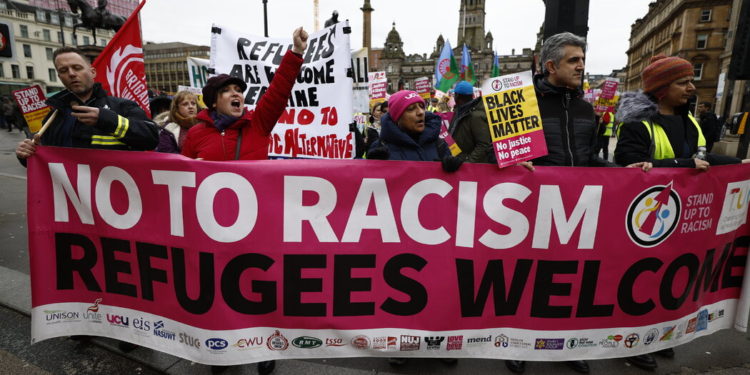By THE NEW YORK TIMES
A sweeping law targeting hate speech went into effect in Scotland on Monday, promising protection against threats and abuse but drawing criticism that it could have a chilling effect on free speech.
The law, which was passed by the Scottish Parliament in 2021, expands protections for marginalized groups and creates a new charge of “stirring up hatred,” which makes it a criminal offense to communicate or behave in a way that “a reasonable person would consider to be threatening, abusive or insulting.”
A conviction could lead to a fine and a prison sentence of up to seven years.
The protected classes as defined in the law include age, disability, religion, sexual orientation and transgender identity. Racial hatred was omitted because it is already covered by a law from 1986. The new law also does not include women among the protected groups; a government task force has recommended that misogyny be addressed in separate legislation.
J.K. Rowling, the “Harry Potter” author who has been criticized as transphobic for her comments on gender identity, said the law was “wide open to abuse by activists,” and took issue with its omission of women.
Ms. Rowling, who lives in Edinburgh, said in a lengthy social media post on Monday that Scotland’s Parliament had placed “higher value on the feelings of men performing their idea of femaleness, however misogynistically or opportunistically, than on the rights and freedoms of actual women and girls.”
“I’m currently out of the country, but if what I’ve written here qualifies as an offense under the terms of the new act,” she added, “I look forward to being arrested when I return to the birthplace of the Scottish Enlightenment.”
The new law has long had the support of Scotland’s first minister, Humza Yousaf, but it has raised concerns about the effect it might have on free speech. Mr. Yousaf, who was Scotland’s justice secretary when the bill was passed, was asked directly on Monday about the criticism from Ms. Rowling and others who oppose the law.
“It is not Twitter police. It is not activists, it is not the media. It is not, thank goodness, even politicians who decide ultimately whether or not crime has been committed,” Mr. Yousaf told Sky News. He said that it would be up to “the police to investigate and the crown, and the threshold for criminality is incredibly high.”
The law was introduced after a 2018 study by a retired judge recommend consolidating the country’s hate crime’s laws and updating the Public Order Act of 1986, which covers Britain and Northern Ireland. Scotland’s Parliament approved the new law 82-32 in March 2021.
Supporters of the legislation have spent years rallying support for it, saying it is crucial to combating harassment.
“We know that the impact on those on the receiving end of physical, verbal or online attacks can be traumatic and life-changing,” Siobhan Brown, Scotland’s minister for victims and community safety, said in a statement celebrating the law. “This legislation is an essential element of our wider approach to tackling that harm.”
But there has been fierce pushback against the law, including from Ms. Rowling, and the Scottish Conservative Party, whose leader, Douglas Ross, told Mr. Yousaf during first minister’s questions on March 14 that “the controversial new law is ripe for abuse.” In a separate questions exchange on March 21, Mr. Ross said that the law was “dangerous and unworkable” and that he expected it to “quickly descend into chaos.”
“People like J.K. Rowling could have police at their door every day for making perfectly reasonable statements,” he said.
Mr. Yousaf, who is of Pakistani descent, has cited the 1986 law as proper precedent for the new bill.
“If I have the protection against somebody stirring up hatred because of my race — and that has been the case since 1986 — why on earth should these protections not exist for someone because of their sexuality, or disability or their religion?” he told Parliament on March 21.
The issue of how the Scottish government should handle misogyny has been examined by a government-commissioned task force, which recommended in 2022 that protections for women be added in a separate bill with elements similar to the hate crimes bill that was passed the previous year.
The first minister at the time, Nicola Sturgeon, welcomed the report, promising that her government would give it full consideration. Mr. Yousaf, her successor, has also indicated his support, but there has been no serious movement in Parliament yet.







Discussion about this post